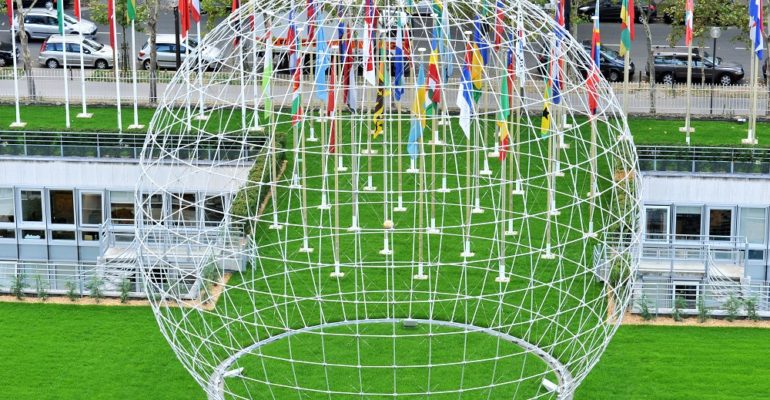The November – December edition of ‘Your Voice at the United Nations’ includes articles on Corporate Social Responsibility and Trafficking in Crisis Situations
‘Unconscious bias’
Susan Siegal, President and CEO of Americas Society/Council of the Americas, opened the AS/COA Sixth Annual Women’s Hemispheric Network Conference on 19 October, welcoming attendees and those watching the live webcast. SI UN Representative in New York, Sandy Hecker attended the conference which focused on the importance of building an impactful personal brand and the effects of unconscious bias, on the ability for women to succeed in their careers.
The first panel discussed what is required for a women to succeed in one’s preferred choice of business or vocational career. Today many will have more than one career, and therefore, women need more successful mentors. Women must look inside and outside their own professional networks to increase public image, and develop skill sets to succeed. Women should not to be afraid to take chances. For example, do not wait for a promotion. Ask for one. It is important to work with men to gain gender equality and equity without bias, and to stop using the words diversity and inclusion, as in the business sector, these words weaken women.
The second panel focused on bias. There are two – implicit and explicit. Becoming pregnant can be an explicit bias, and an example of implicit bias is when men say I support women, yet are weak on appropriate mentorship due to stereotypical views on women. In Mexico, Hon. Christina Diaz from Nuevo Leon is pushing for legislation on education, gender equality and ageing. How women and men sit in a conference room is critical to changing the mindset of both men and women.
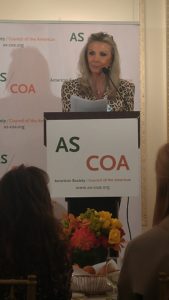
Gina Diez Barroso
Gina Diez Barroso, President and CEO of Grupo Diarq spoke on her father, whose mentoring and inspiration led her to be a successful entrepreneur. In 2005, she opened CENTRO University, the first university in Mexico City specialising in creative studies and also, the first university in the world to have LEED (Leadership in Energy and Environmental Design) platinum certified complex, using energy efficient materials. The university was built using solar panels, green roofs and recycled material.
Barroso also founded Dalia Empower, a foundation which leads women into careers in government, diplomacy and business. She designed an inclusive methodology that maximises each woman’s abilities, reinforcing academic knowledge and emotional skills.
![]()
‘Trafficking in Persons in the Context of Conflict and Crisis Situations’
Soroptimist International UN Representative in Vienna, Dora Vrdlovec attended Trafficking in Persons in the Context of Conflict and Crisis Situations on 20 October, organised by the Austrian Task Force on Combating Human Trafficking, OSCE Special Representative and Coordinator for Combating Trafficking in Human Beings, the Vienna Institute for International Dialogue and Cooperation (VIDC) and the International Organization for Migration (IOM).
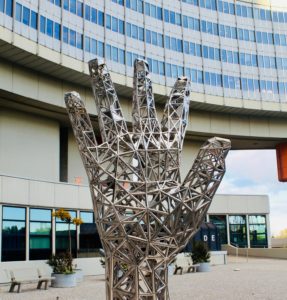
United Nations Centre, Vienna
In conflict and crises situations, vulnerable people, youth, women and girls, are at risk of being trafficked for terrorist activities, and additional support and laws that consider this specific aspect of trafficking are required. In 2016, the UN Security Council by adopting resolution 2331 condemned all instances of human trafficking in areas affected by armed conflict as the sale of, or trade in, persons seized by terrorist groups for purposes of sexual exploitation, and exploitation of forced labour. The breakdown of law, the deprivation of rights and protection in conflict areas makes civilians vulnerable to human trafficking. Conflicts and humanitarian emergencies also lead to forced migration. The fight to end human trafficking requires a systematic wide approach involving governments, the private sector, civil society, and international organisations.
In his welcoming remarks, the Austrian Vice Chancellor and Minister of Justice Wolfgang Brandstetter emphasised that “human trafficking is an ever growing and mostly underreported, gross human rights violation that increased alarmingly in the context of the mass migration flows in the last years. Austria is affected as a transit as well as a destination country and we are committed to end this horrendous crime”. Lamiya Aji Bashar, Yazidi human rights activist, winner of Sakharov Prize for Freedom of Thought, 2016, reminded participants that 3,500 Yazidi women are still enslaved with ISIS for more than 3 years. She said: “It’s not enough to hold conferences, we have to do something practical for all the victims”. Through a human rights-based approach to security, extensive field presence and regional focus, the OSCE has been responding to emerging security crises such as conflict, large movements of people and trafficking for the purpose of terrorism by developing innovative and practical solutions to assist participating State’s efforts to tackle trafficking in persons.
‘UNESCO 39th General Conference’
UNESCO’s 39th General Conference convened 30 October – 14 November with SI UN Representatives in Paris, Rina Dupriet and Marie-Christine Gries in attendance. The two-week General Conference discussed a wide range of issues, and determines the policies and the main lines of work of the organisation.
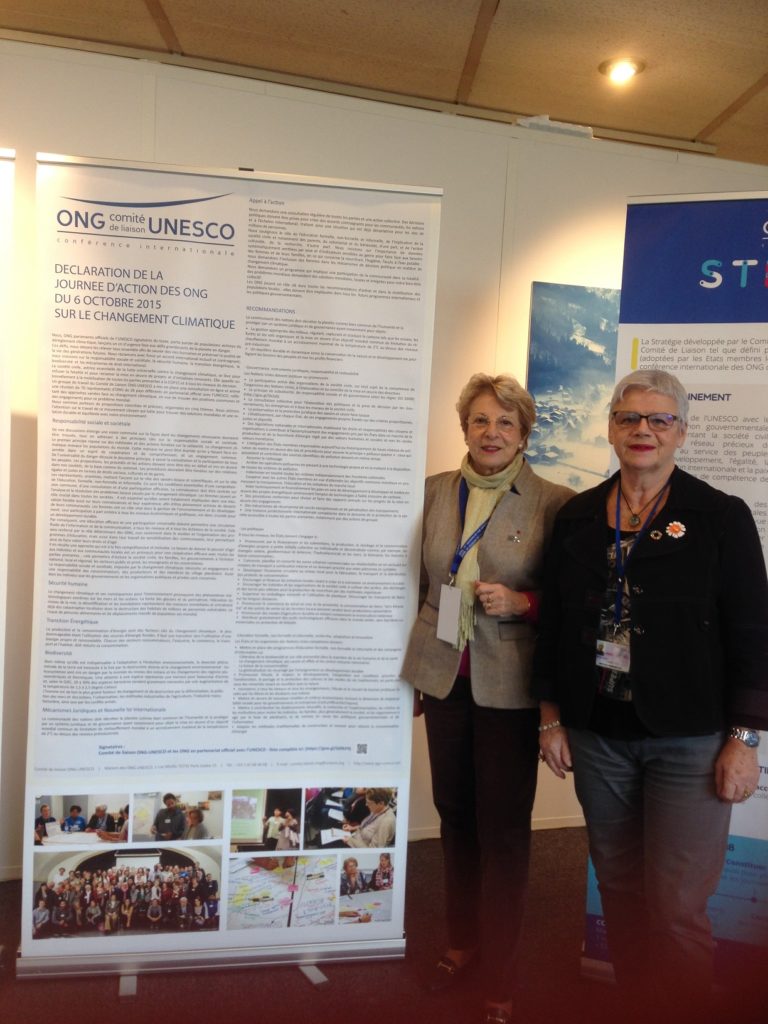
SI UN Representatives, Marie-Christine Gries and Rina Dupriet
Thematic Action Focus Areas
UNESCO actions on climate change shall target thematic focus areas, prioritising Gender Equality, Africa, and Youth.
Global Priority: Gender Equality:
As women suffer disproportionately from poverty, they will also suffer most when erratic weather brings droughts or floods to marginal lands or crowded urban areas where poverty is most felt. Women are also in the best position to influence changes in behaviour for better disaster risk management, as well as participate in and manage post-disaster efforts. Men and women have different access to public awareness information, including early warning systems. UNESCO will ensure gender equality considerations are mainstreamed throughout the implementation of UNESCO Strategy for action on Climate Change, including equal participation of women and men in the decision-making processes.
Global Priority: Africa:
Recognising that climate change could endanger the future well-being of the population, ecosystems and socio-economic progress of Africa, UNESCO shall aim to improve education, outreach and the policy dimension of addressing climate in African countries, in addition to its direct contribution to the regional knowledge base. In the area of water, UNESCO’s International Hydrological Programme (IHP) is implementing projects related to knowledge generation and capacity-building for water management under climate stress in all regions of Africa.
Global Priority: Youth:
The environmental, social and economic consequences of climate change, impact youth access to safe and adequate water and food, as well as education, good health, housing, work and an overall standard of living. Climate change also exacerbates poverty and enhances migration, leading to challenges related to the social inclusion of young migrants. Youth embody the present and the future of the planet. There are currently 1, 8 billion young people between the ages of 10 and 24 in the world. These young people have the power to transform societies towards a climate resilient future. UNESCO, through its NGO-UNESCO Liaison Committee, Youth Networks and UNESCO Associated Schools Project Network, will engage with the global NGO Community, youth and schools on issues of common interest linked to actions promoting the implementation of UNESCO Strategy.
Election of New Director General of UNESCO
Audrey Azoulay is a senior French civil servant, politician and former Minister of Culture and Communication. With a longstanding commitment in favour of intercultural and inter-generational dialogue to advance education for all and the dissemination of scientific and cultural knowledge, she is determined to maintain this commitment as the head of UNESCO. The Director General will spare no effort in ensuring that UNESCO fulfils its universal mandate fully in promoting values of humanism and openness and serving as a driving force in the United Nations system.
According to Audrey: “none of the major challenges facing the world today can be met by any one country on its own without relying on the fundamental pillars of science, education and culture. Thus, UNESCO can and must fully participate in a world order based on multi-lateralism and humanism values”.
![]()
‘The Power of Purpose: The Corporate Responsibility Summit’
On 16 November, SI UN Representative in New York, Sandy Hecker attended the The Power of Purpose: The Corporate Responsibility Summit, organised by The Atlantic, brought together business executives, employees, community leaders and experts to analyse the impact, the potential and the downsides of corporations speaking out and taking action. Social impact is the new measure of a corporation’s bottom line. Beyond working for stock price and shareholder value, companies are expected to stand up for their employees, their customers and their beliefs. In response to the Paris Climate Agreement, the corporate sector in the USA has acknowledged their responsibility to manufacture products that are environmentally friendly. Businesses are analysing policies and joining hands with NGOs – Microsoft is the biggest donor to the NGO sector, its foundation, The Bill and Melinda Gates Foundation, is a leader and an example for other businesses, foundations, organisations, agencies, and NGOs. Annual donations are in the billions with hope to raise trillions.
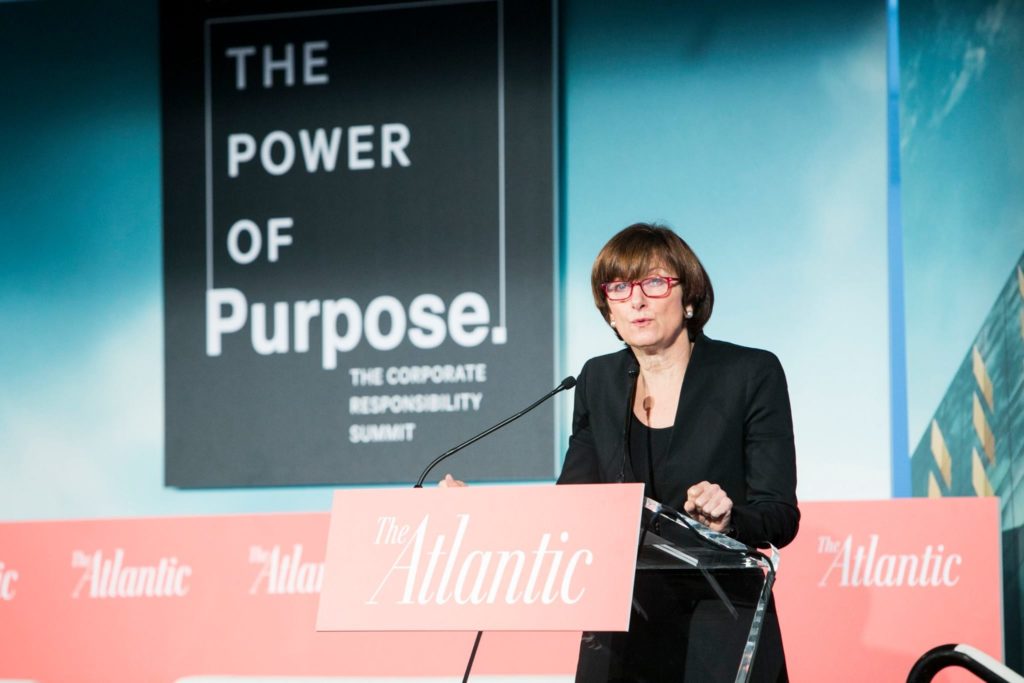
Remarks by Margaret Low, President, AtlanticLIVE. Photo credit: Kristoffer Tripplaar
Corporate social responsibility (CSR) will save the lives of girls and women. CSR will empower women to be leaders and to earn an income, feed their families, improved health care and clean water. The business sector is recognising the need for gender lens investments. Women, the drivers in economies, are often the most active in communities, and more should enter into politics and leadership roles. Gender budgeting can make this happen. Increasing numbers of young people act in a socially responsible manner and join their older colleagues in investing for a better future. All size businesses and organisations are finding creative strategies to tackle hunger, build schools, and better health care.

